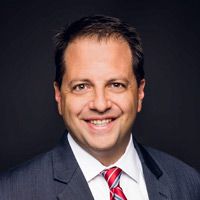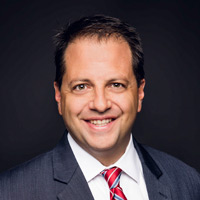Transitioning to Retirement Is Like Moving to a New World – Bring a Map
To truly be ready to retire, you need to fully explore the unfamiliar territory ahead. Your retirement future can be broken down into five distinct "worlds," each with its own danger zones that you need to navigate.


Profit and prosper with the best of Kiplinger's advice on investing, taxes, retirement, personal finance and much more. Delivered daily. Enter your email in the box and click Sign Me Up.
You are now subscribed
Your newsletter sign-up was successful
Want to add more newsletters?

Delivered daily
Kiplinger Today
Profit and prosper with the best of Kiplinger's advice on investing, taxes, retirement, personal finance and much more delivered daily. Smart money moves start here.

Sent five days a week
Kiplinger A Step Ahead
Get practical help to make better financial decisions in your everyday life, from spending to savings on top deals.

Delivered daily
Kiplinger Closing Bell
Get today's biggest financial and investing headlines delivered to your inbox every day the U.S. stock market is open.

Sent twice a week
Kiplinger Adviser Intel
Financial pros across the country share best practices and fresh tactics to preserve and grow your wealth.

Delivered weekly
Kiplinger Tax Tips
Trim your federal and state tax bills with practical tax-planning and tax-cutting strategies.

Sent twice a week
Kiplinger Retirement Tips
Your twice-a-week guide to planning and enjoying a financially secure and richly rewarding retirement

Sent bimonthly.
Kiplinger Adviser Angle
Insights for advisers, wealth managers and other financial professionals.

Sent twice a week
Kiplinger Investing Weekly
Your twice-a-week roundup of promising stocks, funds, companies and industries you should consider, ones you should avoid, and why.

Sent weekly for six weeks
Kiplinger Invest for Retirement
Your step-by-step six-part series on how to invest for retirement, from devising a successful strategy to exactly which investments to choose.
Maybe you managed to pull together a down payment for your first house without some sort of formal savings plan. Many people do.
Maybe you even got your kids through college without any real strategy for how to pay for it. It happens.
So maybe you think you can lick this retirement savings thing, too. Perhaps with a buy-and-hold investment strategy, or simply figuring it out as you go, you’ll hoist yourself over one last financial hurdle before you hit the finish line. Good luck.
From just $107.88 $24.99 for Kiplinger Personal Finance
Become a smarter, better informed investor. Subscribe from just $107.88 $24.99, plus get up to 4 Special Issues

Sign up for Kiplinger’s Free Newsletters
Profit and prosper with the best of expert advice on investing, taxes, retirement, personal finance and more - straight to your e-mail.
Profit and prosper with the best of expert advice - straight to your e-mail.
Retirement isn’t the finish line; it’s the starting line for a whole new way of life. One without a paycheck.
You’ll be living off relatively fixed finances, on an income you determine yourself. So, the decisions you make as you transition from working to retirement will help establish how long your money will last and how comfortable you’ll be. To make the journey to and through retirement without some sort of plan just might be the most daunting endeavor you could ever take on.
Yet, people try it. Some without even realizing how unprepared they are. Like a married couple I met with recently in my office: Mid- to late-50s. All assets focused on growth. No income plan, really, just a hodgepodge of investments that meant they’d do well when the market is up and have to live leanly when it’s down.
They had a portfolio. They needed a plan.
Over the years, we’ve seen investors in this same situation over and over again. Some are worried, some unaware, some simply naïve about what they’ll need for the retirement lifestyle they want. All are vulnerable — even if they’ve worked hard at saving — because they’re traveling new territory without a map.
So we talk about the obstacles they might encounter that could keep them from experiencing the retirement they want. There are the obstacles they know about — and those are typically the concerns they come in with — but there are also barriers they don’t foresee that could keep them from enjoying their wealth to the fullest.
Wealth has two sides: lifestyle and legacy. If you could wave a magic wand and have anything you wanted, what would that look like? Think of it like pulling up Google Maps: You put in the destination first and then find your way.
We call our process the “Retirement Navigator,” and it takes each client through five “worlds” they should explore before and during their retirement.
World No. 1 – Income
Maybe you’ll have a pension, and, of course, there’s your Social Security benefit. But you’ll likely need to use your nest egg to make sure an adequate retirement paycheck keeps coming month after month. The first step for most is to change focus from accumulation to preservation. When you retire, the rules change. You can’t just ride the market up and down the way you did when you were younger and had time to recover from a loss. You’ll want to include strategies that provide consistent income, so you can have the lifestyle you want no matter what happens in the market. These strategies might include income-producing real estate, guaranteed annuities, CDs and/or bonds.
World No. 2 – Growth
The challenge here is to put together a portfolio that’s less vulnerable to volatility but still includes investments that will help offset inflation. This could include a more focused approach — an institutional portfolio or actively managed account — to help minimize risk and take advantage of growth opportunities. You also might want to consider alternative investments such as commodities or real estate.
World No. 3 – Tax-efficiency
Of course, your income and investment plans won’t be worth much if you end up giving most of your money back to Uncle Sam. So you’ll want to make sure all the pieces of your plan are working in the most tax-efficient way. It seems as if many Americans’ CPAs are on one side of town and their financial advisers are on the other; they might talk once a year or not at all. Why not bring the two together when building and modifying your overall plan? That way you can be sure you’re not only making the best moves year to year but also through your entire retirement and even to the benefit of your beneficiaries. Consider tax-favored investments or insurance products that can minimize your tax bill in retirement.
World No. 4 – Health and Long-Term Care
According to one report from the U.S. Senate, the cost of seniors’ most commonly used brand-name drugs is increasing at 10 times the rate of inflation. The U.S. Centers for Medicare and Medicaid Services projects health care spending will rise 5.5% annually, on average, from now until 2026. Long-term care costs are just as daunting; Genworth’s “2018 Cost of Care Survey” reported annual median costs of long-term care support services increased an average of 3% from 2017 to 2018, with some categories surpassing by two to three times the 2.1% U.S. inflation rate . The insurance industry is creating more products aimed at long-term care, including life insurance that allows you to access the death benefit under certain circumstances. The important thing here is to explore all your options before you need care.
World No. 5 – Leaving a Legacy
This is another often-ignored piece of retirement planning. A 2017 Ameriprise study found that most survey participants (83%) want to leave money or assets to a loved one; however, only 64% feel they’re on track to leave an inheritance, and even fewer (50%) have a formal plan in place. It’s possible to design a plan that helps accomplish your income goals first, while allowing room to leave a legacy. This is also an area where there can be a disconnect among advisers, so make sure your financial adviser, CPA and attorney are on the same page regarding your wishes.
Having a navigation process can help you maneuver past the obstacles on the way to retirement and allow you to enjoy yourself more once you get there. You won’t have to monitor the stock market or worry about which world events might affect your nest egg. Instead, you can put your energy into crossing off the items on your bucket list.
Fee-based financial planning and investment advisory services are offered by Ladin Financial Group, a Registered Investment Advisor in the State of Florida. Insurance products and services are offered through Ladin Consulting Group. Ladin Financial Group and Ladin Consulting Group are affiliated companies. Investing involves risk, including the potential loss of principal. Any references to guarantees generally refer to fixed insurance products, never securities or investment products. Insurance and annuity product guarantees are backed by the financial strength and claims-paying ability of the issuing insurance company. Our firm does not provide, nor is any statement contained here in intended to provide tax or legal advice, all individuals are encouraged to consult with qualified professionals prior to making any decisions about their personal situation.
Kim Franke-Folstad contributed to this article.
Profit and prosper with the best of Kiplinger's advice on investing, taxes, retirement, personal finance and much more. Delivered daily. Enter your email in the box and click Sign Me Up.

Michael Ladin is founder and CEO of Ladin Tax & Financial Group, a firm that focuses on assisting Florida business owners, Baby Boomers and retirees with retirement income strategies that work in a tax-efficient way.
-
 Nasdaq Leads a Rocky Risk-On Rally: Stock Market Today
Nasdaq Leads a Rocky Risk-On Rally: Stock Market TodayAnother worrying bout of late-session weakness couldn't take down the main equity indexes on Wednesday.
-
 Quiz: Do You Know How to Avoid the "Medigap Trap?"
Quiz: Do You Know How to Avoid the "Medigap Trap?"Quiz Test your basic knowledge of the "Medigap Trap" in our quick quiz.
-
 5 Top Tax-Efficient Mutual Funds for Smarter Investing
5 Top Tax-Efficient Mutual Funds for Smarter InvestingMutual funds are many things, but "tax-friendly" usually isn't one of them. These are the exceptions.
-
 Social Security Break-Even Math Is Helpful, But Don't Let It Dictate When You'll File
Social Security Break-Even Math Is Helpful, But Don't Let It Dictate When You'll FileYour Social Security break-even age tells you how long you'd need to live for delaying to pay off, but shouldn't be the sole basis for deciding when to claim.
-
 I'm an Opportunity Zone Pro: This Is How to Deliver Roth-Like Tax-Free Growth (Without Contribution Limits)
I'm an Opportunity Zone Pro: This Is How to Deliver Roth-Like Tax-Free Growth (Without Contribution Limits)Investors who combine Roth IRAs, the gold standard of tax-free savings, with qualified opportunity funds could enjoy decades of tax-free growth.
-
 One of the Most Powerful Wealth-Building Moves a Woman Can Make: A Midcareer Pivot
One of the Most Powerful Wealth-Building Moves a Woman Can Make: A Midcareer PivotIf it feels like you can't sustain what you're doing for the next 20 years, it's time for an honest look at what's draining you and what energizes you.
-
 I'm a Wealth Adviser Obsessed With Mahjong: Here Are 8 Ways It Can Teach Us How to Manage Our Money
I'm a Wealth Adviser Obsessed With Mahjong: Here Are 8 Ways It Can Teach Us How to Manage Our MoneyThis increasingly popular Chinese game can teach us not only how to help manage our money but also how important it is to connect with other people.
-
 Looking for a Financial Book That Won't Put Your Young Adult to Sleep? This One Makes 'Cents'
Looking for a Financial Book That Won't Put Your Young Adult to Sleep? This One Makes 'Cents'"Wealth Your Way" by Cosmo DeStefano offers a highly accessible guide for young adults and their parents on building wealth through simple, consistent habits.
-
 Global Uncertainty Has Investors Running Scared: This Is How Advisers Can Reassure Them
Global Uncertainty Has Investors Running Scared: This Is How Advisers Can Reassure ThemHow can advisers reassure clients nervous about their plans in an increasingly complex and rapidly changing world? This conversational framework provides the key.
-
 I'm a Real Estate Investing Pro: This Is How to Use 1031 Exchanges to Scale Up Your Real Estate Empire
I'm a Real Estate Investing Pro: This Is How to Use 1031 Exchanges to Scale Up Your Real Estate EmpireSmall rental properties can be excellent investments, but you can use 1031 exchanges to transition to commercial real estate for bigger wealth-building.
-
 Should You Jump on the Roth Conversion Bandwagon? A Financial Adviser Weighs In
Should You Jump on the Roth Conversion Bandwagon? A Financial Adviser Weighs InRoth conversions are all the rage, but what works well for one household can cause financial strain for another. This is what you should consider before moving ahead.